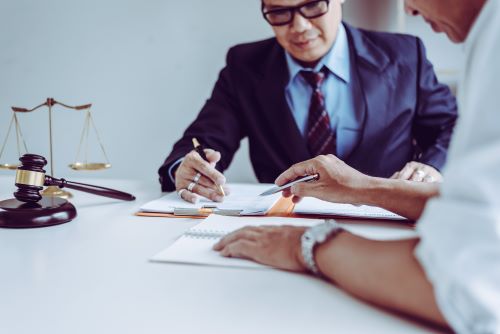
Determining fault is a fundamental part of every personal injury case. By definition, determining fault means identifying who is responsible for an accident (or injury) and, thereby, determining who is liable for the resulting damages. This decision plays a pivotal role in determining any the ensuing legal actions. By establishing fault, injured parties can seek compensation for medical expenses, lost wages, pain and suffering, and other damages.
In the state of California, fault can be determined through two primary means: acceptance or ruling by a jury trial. When an accident occurs, fault may be accepted by the involved parties if they simply acknowledge their responsibility in causing the incident. They can do so tacitly by settling a case, as well, keeping fault technically “ambiguous” while settling liability for damages. Alternatively, if fault is disputed or not readily accepted, it may be determined through a jury trial, where a panel of impartial individuals assesses the evidence and reaches a decision.
If you’ve been involved in an accident, and you’re still unsure whether you or the other party is entirely to blame, it will be important to secure the help of a skilled Fresno personal injury attorney. At Singh Ahluwalia Attorneys at Law we’re here to help, and equipped to provide you with a free, confidential, no-obligation case review. All you have to do is call (559) 878-4958 or contact us online to schedule your appointment today.
What Are the California Accident Fault Laws?
When it comes to determining liability in an accident, California follows a fault-based system. Under this system, the party at fault for causing the accident is ultimately responsible for the resulting damages and injuries. It’s essential to understand some key laws and legal codes that govern fault determination in California.
Comparative Fault Law
California operates under the principle of comparative fault, which means that multiple parties can share fault for an accident.
The state follows a “pure comparative negligence” rule, as outlined in California Civil Code Section 1714(a). This rule allows injured parties to seek compensation even if they are partially at fault. However, their compensation will be reduced by their percentage of fault.
Negligence Law
Negligence is a central concept in determining fault in California accidents. Negligence refers to the failure to exercise reasonable care, when it results in harm or injury to another person.
California law requires individuals to act reasonably and prudently in various situations, such as when operating a vehicle or maintaining safe premises. If one fails to meet this standard of care, they will likely be found to be at fault for the relevant accident.
California Vehicle Code
The California Vehicle Code (CVC) contains regulations and laws that govern traffic rules and driver conduct. Violations of the CVC can contribute to determining fault in accidents. For example, a driver who fails to yield the right of way may be considered at fault if their actions contribute to a collision.
Can a Police Officer Determine Fault In An Accident?
While yes, fault can traditionally be determined through either acceptance or with the help of a full jury trial, a police officer can also determine fault at the scene of an accident. In this way, police officers often play a crucial role in accident investigations — especially because they provide the key assessment of fault; their police report. Their assessment can carry heavy evidential weight of fault in any eventual jury trial.
How Does a Police Officer Determine Who Is At Fault In An Accident?
When an accident occurs, one of the first responders is often a police officer. Their primary role is to ensure public safety, document the incident, and gather relevant information for accident reports. Police officers are trained to assess the situation, interview involved parties and witnesses, and document the details of the accident.
During their investigation, police officers may issue citations for moving violations if they determine that one or more parties involved in the accident violated traffic laws. They may also document the primary causes of an accident as stemming from one party, both, or neither.
What Are Moving Violations?
Moving violations are actions that occur while a vehicle is in motion and acting in violation of traffic laws. These violations are typically associated with negligent or reckless behavior that can contribute to accidents and endanger the safety of others on the road.
Some common examples of moving violations include failure to yield, failure to observe surroundings, and following too closely. Failure to yield occurs when a driver does not give the right of way to another vehicle or pedestrian as required by law. Failure to observe surroundings refers to a driver’s failure to be aware of their surroundings and potential hazards, such as not checking blind spots before changing lanes. Following too closely, also known as tailgating, refers to driving too closely behind another vehicle, leaving inadequate time to react and avoid a collision.
How Can A Citation Affect Fault Determination?
The police report generated by the officer at the accident scene serves as an important piece of evidence. It contains details of the accident, statements from involved parties and witnesses, and the officer’s assessment of the situation. This report can provide valuable information that helps determine fault in insurance claims and legal proceedings.
Moreover, if a citation is issued to one of the parties involved in the accident, it will often affect your insurance company’s fault determination. Insurers typically consider the police report, including any citations issued, when assessing liability and deciding on claim settlements. A citation can indicate that the party violated traffic laws and was therefore at fault for the accident.
It’s important to remember that fault determination by a police officer is not the final word on liability. It serves as a valuable piece of evidence that can influence insurance companies and subsequent legal proceedings. However, parties involved in the accident still have the right to contest the citation or present additional evidence to support their position of fault. In some cases, the information on the initial report may even be barred from consideration as evidence. Seeking legal advice from a personal injury attorney can help navigate these complexities and protect your rights.
How Will An Admission of Fault Affect My Settlement?
In most personal injury cases, a settlement refers to an agreement reached between the injured party and the responsible party or their insurance company. It is a resolution of the dispute that occurs without anyone needing to go to trial, where both parties agree to specific terms and conditions. The primary purpose of a settlement is to resolve the matter efficiently, outside the courtroom, and reach a mutually satisfactory outcome.
That said, settling a case does not necessarily equate to admitting fault. A settlement is a negotiation and compromise made to avoid the uncertainties and risks associated with going to trial.
Accepting a settlement is not an admission of guilt or liability by either party involved. Instead, it signifies a willingness to reach a resolution and move forward without further litigation.
Why Would I Choose to Settle Outside of Court?
There are several reasons why those involved in a personal injury case may choose to pursue a settlement rather than proceed to trial:
- Avoiding the uncertainty of a trial outcome: Trials can be unpredictable, and there is no guarantee of a favorable outcome for either party. By settling, both parties can have more control over the outcome and avoid the risk of an unfavorable judgment.
- Time and cost considerations: Trials can be lengthy and expensive processes. They require extensive preparation, court appearances, expert testimonies, and legal fees. Opting for a settlement can save the significant time and costs associated with a trial, while allowing the parties to resolve the matter efficiently.
Why Would I Not Choose to Settle Outside of Court?
While settlements provide a way to resolve a personal injury case, it is important to consider the potential consequences:
- Impact on fault determination: Settling a case does not necessarily imply fault admission, but it can influence how fault is perceived. Any insurance companies or other parties involved may interpret a settlement as an acknowledgment of shared responsibility or liability, even if it is not legally binding as such. It is essential to consult with an attorney to ensure that your settlement negotiations (and agreements) are appropriately framed to protect your interests.
- Effect on insurance premiums: Settling a personal injury claim may impact your insurance premium. Insurance companies consider various factors, including fault determination and the settlement amount, when assessing risk and determining future premiums. Before settling, you should always consult with a professional to make sure you really understand the potential consequences the agreement may have on your insurance rates and coverage.
At the end of the day, the fault determination will directly impact your ability to seek fair compensation for your injuries and damages. In especially complex cases, finding fault may not be as straightforward, and could even end in both parties sharing a comparative fault ruling. There, and in any case, it will be especially important to find the help of a skilled car accident attorney in Fresno, CA.
Get Help Reaching a Settlement From an Experienced Car Accident Attorney
Car accident lawyers bring experience, knowledge, and a strategic approach to the table, which can help ensure your case is handled diligently and effectively. Along the way, they can also help you navigate the complexities of fault determination, while protecting your rights, and ultimately helping you obtain the compensation you deserve after experiencing an accident or injury.
So reach out to our team at Singh Ahluwalia Attorneys at Law today. All you have to do is call (559) 878-4958 or contact us online to schedule your first appointment, where we can go over all the facts of your case, and help you strategize for the easiest path forward.


